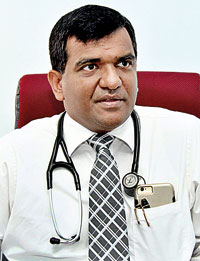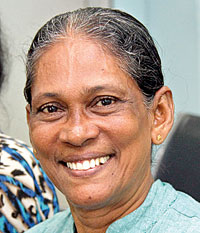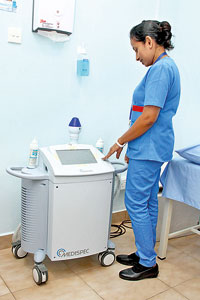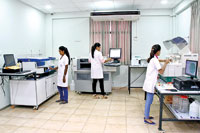All doors open to holistic care
View(s):Kumudini Hettiarachchi reports on a one stop unique medical facility, a first in the private health sector in Sri Lanka

What is best for me, checks out a patient. Pix by Indika Handuwala
It is a busy Saturday and as morning advances to noon, men, women and children gather on the spacious and airy second floor of a building with a dark blue façade. It is a ‘baby’ in this bustling health square in the very heart of Colombo, home to both government and private health facilities.
It is, however, a ‘unique’ baby.
A one-stop-centre where people are being provided ‘holistic’ care in the true sense of the word with multidisciplinary treatment along with prompt and accurate laboratory test results. It is believed to be a first in Sri Lanka in the private health sector, with many other firsts being delivered in the form of services.
And it is to view the operations of the newly-opened ‘Center for Diabetes, Endocrinology and Cardio Metabolism’ (CDEM) that MediScene is here on January 7. While CDEM on Norris Canal Road, Colombo 10, had its soft-opening on May 1, the ceremonial opening by President Maithripala Sirisena was just two months ago, aptly on World Diabetes Day – November 14.
“CDEM is modelled on a similar centre in Oxford, United Kingdom, but goes beyond to offer much more,” says Consultant Endocrinologist & Diabetologist, Dr. Prasad Katulanda who is part of the core team which mooted this idea.
The other core team members include Consultant Cardiologist Dr. Vajira Senaratne; Consultant Chemical Pathologist Dr. Gaya Katulanda; Consultant in Sexual Health Dr. Lasantha Malavige; Consultant Vascular & Transplant Surgeon Dr. Rezni Cassim; and Consultant Nephrologist Dr. Rushika Lanerolle. Many other top doctors, nearly 40 consultants including Consultant Paediatric Endocrinologist Dr. Navoda Atapattu, are part of the service.

Dr. Prasad Katulanda
Chintha Kumari Muthukuda, 57, from Matugama is a first-time patient here while R. Tiranagama, 79, from Galle is a regular since CDEM opened.
I can’t imagine what happened,” says Mrs. Muthukuda, conceding with a shy smile that she has a fondness for sweets, especially cool drinks. “Den mata seeni thiyenawa.” (I have sugar now.)
Mr. Tiranagama has been in the grip of diabetes for 15 years and on medication. A while ago, he had stepped on a nail but had not realized that there was a wound until it festered. Then he had to get a small surgery done. Three months later, there was a roughening of the sole, like a gal-thelma.
By that time, he had stopped taking his diabetes medication as “I was feeling better”. The leg became red and swollen and when tested his blood sugar had sky-rocketed to 513mg/dL. The usual fasting blood sugar should be less than 100mg/dl. Having undergone a small procedure after being in hospital for three days, now he is on the register at CDEM, taking his medicines scrupulously and getting his feet checked regularly.
On his sixth visit to CDEM, H.L. Pushpakumara, 51, from Ratnapura commends the all-round care being provided here.With non-communicable diseases on the rise in Sri Lanka and 1 in 4 at risk of developing the silent-killer diabetes, Dr. Katulanda explains to MediScene that CDEM is a “pioneering” effort. The Oxford centre deals only with diabetes, endocrinology and metabolism, but CDEM is one step ahead. Taking into account that cardiovascular disease goes hand-in-hand with diabetes that too has come within the treatment provided here.
“Usually health services are provided on a patient’s symptoms but here we have a holistic approach not only encompassing the patient but also his/her family. Otherwise, healthy diets and lifestyles for a person living within a family will not work,” he says, pointing out that if the diseases are due to a family history or genetic predisposition, then the whole family should be part of the lifestyle-sharing programme. “This is why our motto is: Looking after lives.”

Chintha Kumari Muthukuda
Holistic care along with empowerment is our objective, says Dr. Katulanda. Dedicated and experienced doctors of different specialties are working under one roof at CDEM along with a state-of-the-art laboratory to provide quick and accurate results when tests are needed, MediScene learns.
A multidisciplinary team approach is usually not seen elsewhere in the private sector, it is understood, resulting in the care of the patient becoming fragmented and thus leading to the overall care being compromised, while the cost keeps rising.
On Saturday, we see the concept in action. One by one, the patients on the second floor, awaiting their turn to see Dr. Katulanda, while watching either an educational video on diabetes or some such condition, smiling at the antics of comic Mr. Bean or engrossed by the mysteries of nature, are called in.
The patient will move from room to room – with the personnel in the first room taking the weight and height, working out the body-mass index (BMI) and opening a file for him/her, attaching all other health-related documents that the patient has brought. Next, Dr. Katulanda, will thoroughly examine the patient after having taken down his/her clinical case history as well as the medication history.
Thereafter, the patient will pass through a room of young doctors who will provide further advice if necessary and answer any queries they have about the medications they take, how to undergo a fasting blood test etc.
Armed with Dr. Katulanda’s diagnosis, prescription and advice, the patient will next move to the dietician’s room for a detailed description on a healthy diet. As MediScene passes through, we see huge posters on the wall with strong advice on water therapy and also colourful pictures on what a healthy plate of food should look like, while on the dietician’s table are practical tools to guide the patient – a plate, a cup and different sized spoons to give an idea of portions.
If the patient needs physiotherapy, rehabilitation or exercise advice, he/she would be guided to those rooms, while to the rear of the seating area on the second floor itself is a glass showcase with different types of footwear suitable for those with feet issues due to diabetes. Those who need foot screening and care/wound dressing would go down to the first floor to be attended to by experienced nurses.
On the second floor, people can seek nutrition and obesity advice, while the boardroom doubles up as a training room and all staff members undergo instructions starting with the basics on how to greet patients to more complex skills on how to handle an irate patient. If any tests are needed, the patient would go up to the third floor and give samples such as blood and urine. On this floor is also the administration unit.
Any medications prescribed may be purchased from the well-stocked pharmacy on the ground floor, while here too is located the outpatients department (OPD) and a three-bed emergency care unit.
Weekly, comprehensive education and awareness programmes by a multidisciplinary team are also being held for patients and their families. These include information on why they are doing what they have to do, why they need to do certain tests, why they need to take their medications and much more.
“The attitude at CDEM is different. Clinical intervention and patient-care are hands-on,” says Dr. Katulanda, adding that very soon they hope to launch a wide-ranging prevention programme. CDEM has already donated some funds to the Sri Lanka College of Endocrinologists for research and prevention of childhood diabetes.
In the future, CDEM also hopes to work in the area of prevention of hypertension and heart disease. “We’ve already started on the prevention of obesity based on scientific evidence for both children and adults,” says Dr. Katulanda, adding that CDEM’s vision is to bring about a major paradigm shift.
 The machine which administers shock-wave therapy for erectile dysfunction, a first in the country Many specialists under one roof
This simple, non-invasive, pain-free procedure with a high success rate of more than 70% has been used successfully around the world, says Dr. Prasad Katulanda, with plans being underway to develop the fourth floor into a unit attending to patients with erectile dysfunction, so that they could avoid the more public area on the other floors, preventing chance-meetings with known people which could lead to some embarrassment to them. This is while the diabetes-heart link is dealt by specialists such as Dr. Vajira Senaratne and Dr. Gotabhaya Ranasinghe; the diabetes-eye link by Dr. Charith Fonseka; and the diabetes-kidney link by Dr. Rushika Lanerolle. The first floor is dedicated to the cardiac unit and the eye-care unit. While cardiologists can be consulted here, basic evaluations such as echocardiograms and exercise electrocardiograms (ECG) can also be performed immediately, along with trans-oesophageal echocardiograms. Treatment for sleep apnoea is also available, along with other ultrasound scans and nerve-conduction tests.
 The state-of-the-art laboratory providing prompt and accurate results Lab facilities Hormonal diseases require blood and urine tests, MediScene learns, and the lab has the capability to do most, while a few tests not done in Sri Lanka are sent to an accredited lab in India. Among the tests carried out by them are endocrine and hormone tests, blood-sugar tests including HbA1c, creatinine tests, liver-function tests and also the high-sensitivity troponin-I test. Internal quality control is run daily and externally, quality is assured by a reputed laboratory in the United Kingdom | |


